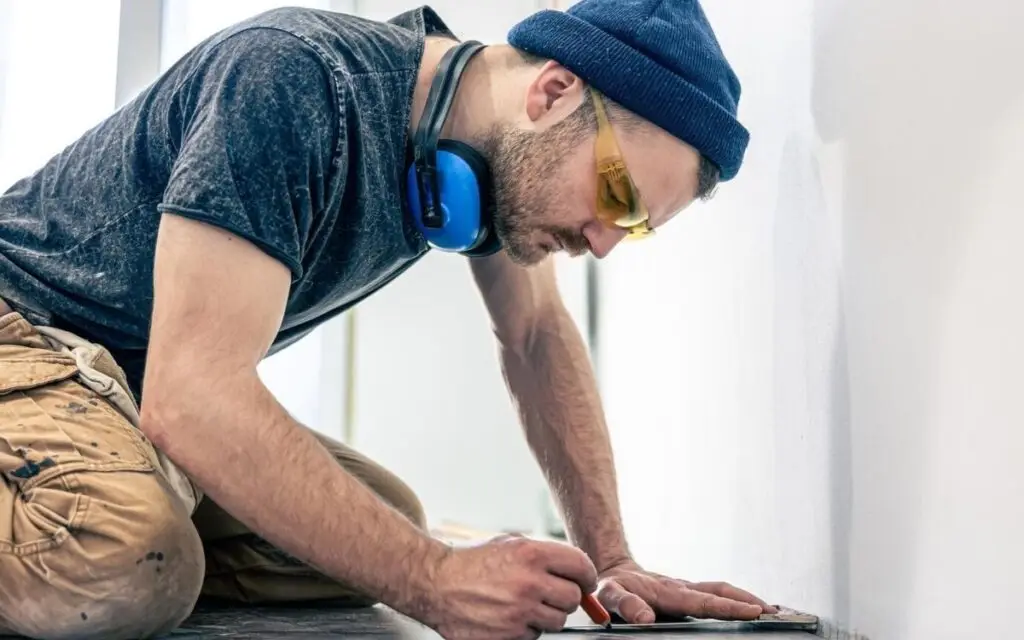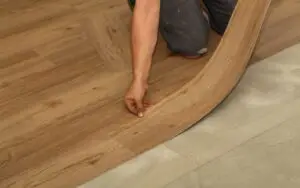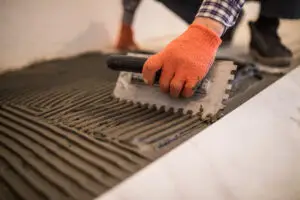Understanding the Lifespan of Floor Polish
What is Floor Polish?
Floor polish is a protective coating applied to flooring surfaces to enhance their appearance, provide a glossy finish, and protect against wear and tear. It acts as a sacrificial layer, absorbing the impact of daily use and preventing damage to the underlying material. The type of floor polish used varies depending on the flooring material, ranging from wax-based options for hardwood to acrylic and polyurethane formulations for tile, linoleum, and other surfaces. However, it’s crucial to understand that the effectiveness and longevity of floor polish depend heavily on factors such as proper application and regular maintenance, areas where professional expertise can make a significant difference.
Factors Affecting Polish Longevity
Several factors influence how long floor polish lasts, including the type of floor, the type of polish used, and the level of foot traffic. The lifespan of floor polish can range from a few months to several years, depending on these variables. However, even the best floor polish will eventually wear down and require reapplication to maintain its protective and aesthetic qualities. While DIY methods may offer a temporary solution, professional floor polishing services provide the expertise and specialized equipment necessary to ensure a long-lasting and durable finish.
Key Factors Determining Polish Lifespan
Type of Floor (Wood, Tile, Concrete, etc.)
The type of floor significantly impacts the lifespan of floor polish. For instance, hardwood floors require specialized wax-based polishes that are less durable than the acrylic or polyurethane polishes used on tile or concrete. Each flooring material has unique properties that affect how well the polish adheres and how resistant it is to wear. Understanding these nuances is critical for selecting the right type of polish and implementing appropriate maintenance strategies, which is why consulting with a professional floor polishing service is highly recommended.
Type of Polish Used
The type of polish used also plays a crucial role in determining its longevity. Wax-based polishes, while providing a classic shine, are less durable and require more frequent reapplication compared to synthetic polishes like acrylic and polyurethane. These synthetic options offer superior resistance to scratches, stains, and water damage, making them ideal for high-traffic areas. However, selecting the right polish requires careful consideration of the floor type, traffic level, and desired aesthetic, factors that a professional can expertly assess.
Traffic Volume
Traffic volume is a major determinant of how long floor polish lasts. High-traffic areas, such as hallways, entryways, and commercial spaces, experience more wear and tear, causing the polish to degrade more quickly. In these areas, regular maintenance and more frequent reapplication are essential to maintain the protective and aesthetic qualities of the floor. Commercial floor polishing services specialize in managing these high-traffic challenges, offering customized solutions to maximize polish lifespan and minimize long-term costs.
The Impact of Foot Traffic on Floor Polish
Residential vs. Commercial Settings
The impact of foot traffic on floor polish varies significantly between residential and commercial settings. Residential floors typically experience less traffic than commercial floors, allowing the polish to last longer. However, even in residential settings, high-traffic areas such as kitchens and entryways require more frequent maintenance. Commercial settings, with their constant flow of people, demand more durable polishes and more rigorous maintenance schedules to prevent premature wear and tear. Professional floor polishing services understand these differences and can tailor their solutions to meet the specific needs of each environment.
High-Traffic Areas: Challenges and Solutions
High-traffic areas present unique challenges for maintaining floor polish. The constant wear and tear can quickly degrade the polish, leading to a dull, scratched, and unattractive surface. To combat these challenges, it’s essential to use durable, high-quality polishes and implement a regular maintenance schedule that includes frequent cleaning, buffing, and reapplication. Professional floor polishing services offer specialized solutions for high-traffic areas, including the use of advanced polishing techniques and durable coatings that can withstand heavy use.
Minimizing Wear and Tear
Minimizing wear and tear is crucial for extending the lifespan of floor polish. This can be achieved through several strategies, including the use of mats and rugs in high-traffic areas, regular sweeping and mopping to remove dirt and debris, and the prompt cleanup of spills to prevent staining. Additionally, avoiding the use of harsh chemicals and abrasive cleaners can help protect the polish from damage. Professional floor polishing services can provide expert advice on how to minimize wear and tear and maintain the beauty of your floors for years to come.
Proper Application: The Key to Polish Longevity
Surface Preparation
Proper surface preparation is essential for ensuring the longevity of floor polish. Before applying any polish, the floor must be thoroughly cleaned to remove dirt, dust, and debris. Any existing coatings or sealers must also be removed to ensure proper adhesion. The surface should be dry and free of any imperfections that could affect the final finish. Professional floor polishing services have the expertise and equipment to properly prepare any type of flooring surface, ensuring a smooth, even, and long-lasting polish.
Application Techniques
The application technique used can significantly impact the lifespan of floor polish. The polish should be applied evenly and in thin coats to prevent drips, streaks, and uneven coverage. Multiple coats may be necessary to achieve the desired level of shine and protection. Proper drying time should be allowed between coats to ensure proper adhesion and curing. Professional floor polishing services employ skilled technicians who are trained in the proper application techniques, ensuring a flawless and durable finish.
Drying and Curing Time
Allowing adequate drying and curing time is crucial for achieving a durable and long-lasting floor polish. The drying time will vary depending on the type of polish used and the environmental conditions, but it’s generally recommended to allow at least 24 hours before allowing foot traffic on the floor. The curing time is the time it takes for the polish to fully harden and reach its maximum strength and durability. Professional floor polishing services understand the importance of proper drying and curing times and will ensure that these are adhered to for optimal results.
Maintaining Your Polished Floors for Maximum Lifespan
Regular Cleaning
Regular cleaning is essential for maintaining the beauty and longevity of polished floors. Sweeping or vacuuming should be done regularly to remove dirt, dust, and debris. Mopping with a neutral pH cleaner can help remove stains and spills without damaging the polish. Avoiding the use of harsh chemicals and abrasive cleaners is crucial for protecting the polish from damage. Professional floor polishing services can provide guidance on the proper cleaning techniques and products to use for your specific type of flooring.
Buffing and Polishing
Buffing and polishing can help restore the shine and luster of polished floors that have become dull or scratched over time. Buffing involves using a specialized machine with a soft pad to gently rub the surface and remove minor imperfections. Polishing involves applying a thin coat of polish to the surface and then buffing it to a high shine. Professional floor polishing services have the equipment and expertise to properly buff and polish your floors, restoring their original beauty and extending their lifespan.
Preventing Scratches and Scuffs
Preventing scratches and scuffs is crucial for maintaining the appearance of polished floors. Using mats and rugs in high-traffic areas can help protect the floor from wear and tear. Avoiding the use of abrasive cleaners and harsh chemicals can also help prevent scratches. Lifting furniture instead of dragging it across the floor can minimize the risk of scuffs. Professional floor polishing services can provide advice on how to prevent scratches and scuffs and keep your floors looking their best.
Types of Floor Polish and Their Durability
Wax-Based Polishes
Wax-based polishes have been used for centuries to protect and enhance the appearance of wood floors. They provide a classic shine and are relatively easy to apply. However, wax-based polishes are less durable than synthetic options and require more frequent reapplication. They are also susceptible to water damage and can be difficult to remove. While DIY wax polishing might seem appealing, professional services offer specialized wax formulations and application techniques that yield superior results.
Acrylic Polishes
Acrylic polishes are synthetic coatings that offer superior durability and resistance to scratches, stains, and water damage compared to wax-based polishes. They are easy to apply and maintain, making them a popular choice for residential and commercial floors. Acrylic polishes are also relatively affordable, making them a cost-effective option for protecting and enhancing the appearance of your floors. While acrylic polishes are easier to work with than wax, professional application ensures even coverage and long-lasting protection.
Polyurethane Polishes
Polyurethane polishes are the most durable type of floor polish available. They offer exceptional resistance to scratches, stains, water damage, and chemicals, making them ideal for high-traffic areas and commercial settings. Polyurethane polishes are also long-lasting, requiring less frequent reapplication than other types of polish. However, they can be more difficult to apply and require specialized equipment and expertise. Professional floor polishing services specialize in the application of polyurethane polishes, ensuring a flawless and long-lasting finish.
How to Identify When Your Floor Needs Repolishing
Visible Wear and Tear
Visible wear and tear is a clear indicator that your floor needs repolishing. This includes scratches, scuffs, dull spots, and areas where the polish has worn away completely. These signs of wear and tear not only detract from the appearance of your floor but also reduce its protective qualities, making it more susceptible to damage. Addressing these issues promptly with professional floor polishing can restore the beauty of your floors and prevent further damage.
Loss of Shine
Loss of shine is another sign that your floor needs repolishing. Over time, the polish can become dull and faded, losing its original luster. This can be caused by dirt, dust, scratches, and the use of improper cleaning products. Repolishing can restore the shine and brightness of your floors, making them look new again. Professional floor polishing services use specialized equipment and techniques to bring out the natural shine of your floors, enhancing their overall appearance.
Water Damage and Stains
Water damage and stains can also indicate that your floor needs repolishing. Water can penetrate the polish and damage the underlying material, leading to discoloration, warping, and mold growth. Stains can also be difficult to remove from polished floors, especially if they are not cleaned promptly. Repolishing can help remove water damage and stains, restoring the beauty and integrity of your floors. Professional floor polishing services can assess the extent of the damage and recommend the appropriate course of action, ensuring that your floors are properly restored and protected.
DIY vs. Professional Floor Polishing: Long-Term Cost
Initial Investment and Maintenance Costs
When considering DIY versus professional floor polishing, it’s essential to compare both the initial investment and ongoing maintenance costs. DIY projects often appear cheaper initially, but the cost of renting or purchasing equipment, buying supplies, and the potential for mistakes can quickly add up. Professional floor polishing services may have a higher upfront cost, but they provide a long-lasting, durable finish that requires less frequent maintenance, potentially saving you money in the long run.
Potential Risks of DIY
DIY floor polishing carries several potential risks, including damage to the flooring, uneven application of the polish, and personal injury. Improper use of equipment, lack of experience, and failure to follow safety precautions can all lead to costly mistakes. Professional floor polishing services have the expertise, equipment, and insurance to mitigate these risks, ensuring a safe and successful outcome.
Professional Benefits: Expertise and Quality
Choosing professional floor polishing services offers numerous benefits, including expertise, quality workmanship, and long-lasting results. Professional technicians are trained in the proper techniques for preparing the surface, applying the polish, and maintaining the finish. They use high-quality products and equipment to ensure a flawless and durable result. By investing in professional floor polishing, you can protect your investment and enjoy beautiful, long-lasting floors for years to come.
Commercial Floor Polishing: Extending Polish Life in High-Traffic Zones
Specialized Polishes for Commercial Use
Commercial floors experience significantly higher traffic than residential floors, requiring specialized polishes that can withstand heavy wear and tear. These polishes are formulated to be more durable, scratch-resistant, and easy to maintain. Professional floor polishing services offer a range of specialized polishes for commercial use, tailored to the specific needs of each environment.
Regular Maintenance Schedules
Regular maintenance is essential for extending the lifespan of floor polish in high-traffic commercial zones. This includes frequent cleaning, buffing, and reapplication of polish as needed. Professional floor polishing services can develop a customized maintenance schedule that ensures your floors always look their best and are protected from damage.
Professional Equipment and Expertise
Maintaining commercial floors requires specialized equipment and expertise. Professional floor polishing services have the tools and knowledge to properly clean, buff, and polish commercial floors, ensuring a consistent and long-lasting finish. They can also identify and address any potential problems before they become major issues, saving you time and money in the long run.
Case Studies: Comparing Floor Polish Lifespans
Residential Floor: DIY vs. Professional
A case study comparing a residential floor that was polished using DIY methods versus one that was professionally polished revealed significant differences in the lifespan of the polish. The DIY floor showed signs of wear and tear within a few months, requiring frequent touch-ups and reapplication. The professionally polished floor, on the other hand, maintained its shine and durability for several years, requiring only occasional maintenance.
Commercial Floor: High-Traffic Examples
A case study of a commercial floor in a high-traffic retail store showed the benefits of using specialized polishes and regular maintenance. The floor was polished with a durable polyurethane coating and maintained with a regular cleaning and buffing schedule. As a result, the floor maintained its shine and appearance for several years, despite the constant foot traffic.
Cost Analysis: Long-Term Savings
A cost analysis comparing DIY versus professional floor polishing revealed that professional services can often be more cost-effective in the long run. While the initial investment may be higher, the long-lasting results and reduced maintenance requirements of professionally polished floors can save you money over time. Additionally, the potential risks and costs associated with DIY projects can quickly offset any initial savings.
FAQs & Answers
The frequency of polishing hardwood floors largely depends on the amount of foot traffic and the type of finish applied. In general, hardwood floors should be professionally polished every 3-5 years. However, high-traffic areas might require more frequent attention. While DIY polishing kits are available, they often lack the precision and durability of professional services. Professionals assess the specific needs of your floor, use commercial-grade products, and employ techniques that ensure a long-lasting shine and protection. This not only enhances the appearance but also preserves the integrity of the wood, making professional polishing a worthwhile investment for maintaining your hardwood floors.
When it comes to longevity, polyurethane-based floor polishes generally outlast other types. These synthetic coatings create a durable, protective layer that resists scratches, stains, and everyday wear and tear. While wax-based polishes offer a classic shine, they require more frequent reapplication. The application of polyurethane polishes, however, is a task best left to professionals. Their expertise ensures the polish is applied evenly, adheres properly, and cures effectively, maximizing its lifespan and protecting your floor from potential damage. Investing in professional application guarantees a superior and long-lasting finish.
Using the same floor polish on all types of floors is not advisable, as different materials require specific formulations to ensure optimal results and prevent damage. For instance, a polish designed for hardwood may not be suitable for tile or linoleum. Professionals understand these nuances and can recommend the appropriate polish for your specific flooring type. They consider factors such as the material's porosity, its susceptibility to scratches, and the desired level of shine. By entrusting the task to professionals, you can avoid costly mistakes and ensure that your floors receive the care they need to maintain their beauty and longevity.
Protecting your floor polish from scratches involves a combination of preventative measures and regular maintenance. Placing mats at entryways, using felt pads under furniture, and promptly cleaning up spills can all help minimize the risk of scratches. However, even with these precautions, scratches can still occur over time. Professional floor polishing services offer solutions for scratch removal and preventative coatings that add an extra layer of protection. They can also advise you on the best cleaning products and techniques to keep your floors looking their best and minimize future damage. Their expertise ensures that your floors remain scratch-free and retain their polished appearance for longer.
Determining whether professional floor polishing is worth the cost requires weighing the benefits against the investment. While DIY options may seem more affordable upfront, they often lack the quality and durability of professional services. Professionals bring expertise, specialized equipment, and high-quality products to the table, resulting in a superior finish that lasts longer and requires less frequent maintenance. Additionally, they can address underlying issues such as scratches, stains, and uneven surfaces, ensuring a comprehensive restoration. Considering the long-term savings on maintenance, repairs, and replacement, professional floor polishing often proves to be a cost-effective investment that enhances the beauty and value of your home or business.





